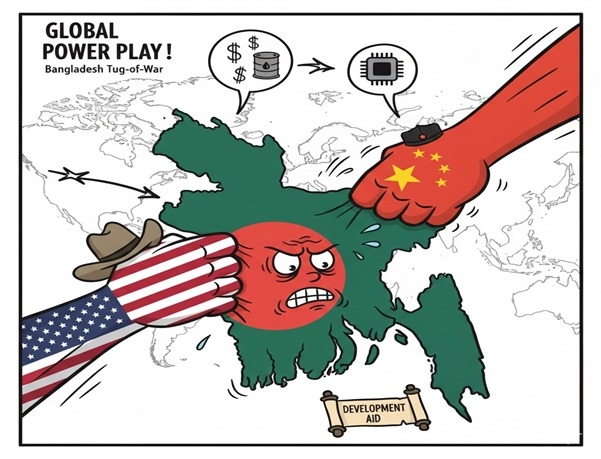Power Plays and Polls: U.S. and China Involvement in Bangladesh’s Unrest and Electoral Landscape
Power Plays and Polls: U.S. and China Involvement in Bangladesh’s Unrest and Electoral Landscape
China and the United States have both demonstrated vested interests in supporting the Bangladesh Nationalist Party (BNP) ahead of the forthcoming Bangladesh elections. Since early 2024, China has actively engaged with all major political parties, including the BNP, Jamaat-e-Islami and the National Citizens Party, through high-level diplomatic meetings such as those led by Chinese Vice Foreign Minister Sun Weidong. China’s outreach aims to position itself as a key political actor willing to work with Bangladesh’s future government, reflecting a strategic effort to maintain influence amid regional power competition. Concurrently, the United States has expressed intentions to expand its influence in the Bay of Bengal region, vocalising support for free and fair elections and deploying observers to ensure transparency. U.S. diplomatic efforts seek to counter China’s growing footprint and not only back democratic processes but also indirectly promote political forces such as the BNP, perceived as alternatives to existing power structures. This dual opposition-backed engagement underscores the heightened geopolitical rivalry in Bangladesh, with China and the USA leveraging their roles to sway the political landscape in their favour ahead of the pivotal elections.

Strategic Importance of the Bay of Bengal
China’s Role in Political Engagement and Military Influence
China supplied over 70% of Bangladesh’s arms 2019–2023, signalling deep military ties. After a 2024 regime change, Beijing broadened outreach to opposition parties, especially BNP, with diplomats like Vice Foreign Minister Sun Weidong, aiming to sustain influence regardless of who governs. Beijing seeks to counter India’s rise and expanding U.S. presence by engaging multiple political actors, including BNP, to protect strategic interests in defense and infrastructure. This multiparty engagement may affect Bangladesh’s political stability and electoral dynamics, posing governance challenges for sovereignty and transparent democracy amid competing external pressures. Civil society and leaders must navigate these ties carefully.
USA’s Strategic Objectives in Bangladesh Politics and Military Interests in Saint Martin Island
The United States has shown strong strategic interest in Bangladesh’s Saint Martin Island, aiming to establish a military base there to monitor key Bay of Bengal shipping lanes and counter China’s expanding influence near Myanmar. Intelligence sources suggest the U.S. is backing political figures like Md. Younis and favouring the BNP to strengthen its foothold in Bangladesh’s political landscape. By supporting BNP against the ruling Awami League, including funding democratic institutions and election observers, the U.S. seeks to manipulate internal power dynamics to its advantage. Establishing the military base would enhance America’s Indo-Pacific presence and reinforce its ability to oversee maritime routes critical for regional security. This approach risks deepening political instability and external influence in Bangladesh, raising concerns about sovereignty and the nation’s democratic processes amid heightened geopolitical competition.
Political Destabilization and Election Dynamics
The recent eruption of violence and unrest sweeping across Bangladesh is a direct consequence of this unholy alliance’s deliberate provocations. In the shadows, China and the USA have stoked tensions, funnelling resources and strategic support to the BNP to ignite and sustain chaos. Their goal is clear: to disrupt the normal political process and subvert the upcoming elections, ensuring BNP’s return to power regardless of the people’s true will.
The latest incidents- unprecedented outbreaks of violence targeting civic institutions and security forces- bear the unmistakable fingerprints of foreign-backed planning. Coordinated propaganda, suspicious funding trails, and behind-the-scenes coordination between BNP operatives and agents aligned with China and the USA have passed beyond rumour into near certainty. This orchestrated breakdown of law and order is a sinister strategy to weaken government authority, intimidate voters and delegitimize a government that refuses to bow to foreign interests. Bangladesh’s sovereignty and democratic future hang in the balance as these external powers manipulate BNP as their proxy to fracture the nation from within. The people of Bangladesh must reject this dangerous foreign-backed conspiracy, stand firm against attempts to hijack the country’s destiny, and reclaim peace and democratic integrity from the forces of meddling and betrayal.
Tussle for Power Amid Growing Political Turmoil
Bangladesh today stands at the crossroads of a crisis deliberately engineered by the collusion of two powerful foreign adversaries - China and the United States. Far from being neutral actors, these global giants plot hand-in-hand with the BNP to destabilize the country’s law and order situation and seize political power through unfair means. China’s influence comes cloaked in investments and diplomatic charm, but beneath the surface lies a ruthless agenda: to subjugate Bangladesh as a strategic outpost for its imperial ambitions. Side by side, the United States manipulates the narrative of democracy and freedom, funnelling covert support and propaganda to the BNP, empowering the party’s disruptive forces to foment chaos and undermine the sovereign government.
This sinister partnership has thrown Bangladesh into turmoil, undermining peace and security to pre-empt elections and guarantee BNP’s ascendancy. Law enforcement agencies are hamstrung and public confidence tanks as violence and unrest spread - all carefully orchestrated to create a climate favourable to foreign-backed political change. The alarm bells ring loud: suspicious funds flow unexplained, narratives are spun to divide and confuse and behind-the-scenes deals between China, the USA, and BNP betray the nation’s interests. Bangladesh’s sovereignty is under assault; its democratic process is being hijacked to serve foreign powers and a local political faction’s selfish ambitions.
Conclusion
Bangladesh’s 2026 elections are a geopolitical fulcrum where China and the USA exert considerable influence to shape political outcomes favouring their strategic interests. China’s economic dominance and military ties, combined with the US’s political engagement and strategic base aspirations on Saint Martin Island, deepen political fault lines. The resulting instability highlights Bangladesh’s delicate position amid competing great powers, with its democratic future and regional peace hanging in the balance.
References: